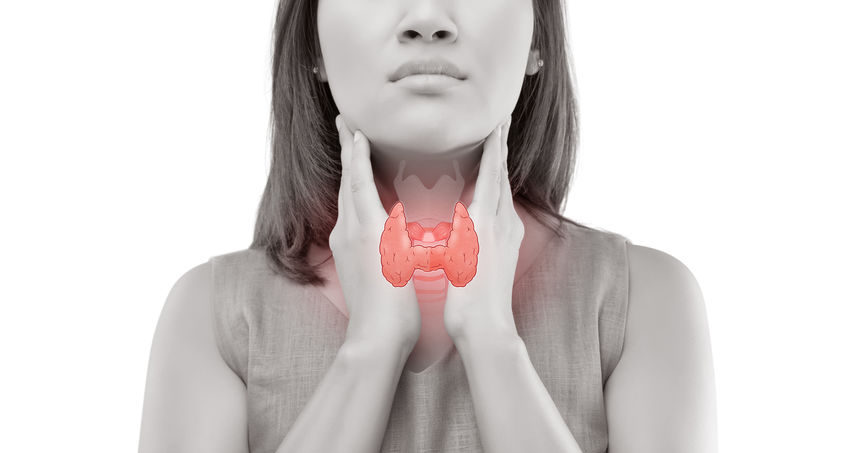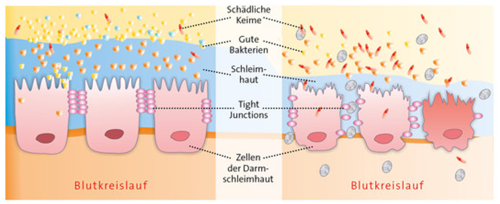Healthy Thyroid - Part 2
The thyroid is the hormone organ that gets our metabolism going and keeps it going. A healthy thyroid is important for well-being, performance and mental clarity. In 1963, iodised salt was introduced as a nationwide iodine prophylaxis. Before that, goiters were very common; nowadays, autoimmune thyroid disorders affect more than 10% of the population. In this disorder, causal treatment consists not only of thyroid substitution but of holistic modulation of the immune system.
Dietary recommendations
Since a large part of the immune system is located in the gut, diet has an impact on auto-immune diseases such as Hashimoto's thyroiditis. It is important to choose a diet that does not irritate the immune system in the gut. To achieve this, two factors are important: the right eating habits and the right foods. There are some foods that often cause immune reactions to be triggered against one's own body when the immune system is disturbed. These include histamine-containing and gluten-containing foods. Whether foods containing histamine should be avoided can be easily determined by a blood test. In the case of gluten, this is usually less clear and can only be found out by an omission test of gluten-containing foods. In such cases, a gluten-free diet for several months makes sense and can lead to a significant improvement in the patient's condition, and often also in the findings.
Food supplement
Selenium
The trace element selenium plays a decisive role in the production of thyroid hormones. Only when it is present in sufficient quantities is the body protected from possible self-destruction in the production of thyroid hormones. Our soils are low in selenium, and a large part of the population is undersupplied with selenium. Adequate selenium supplementation is important for Hashimoto's patients. Studies show that people who live in areas with selenium-rich soils are much less susceptible to thyroid disease.
Iron
Iron is important not only for blood formation, but for the function of the thyroid enzyme thyroid peroxidase. This enzyme causes the storage of iodine in the thyroid hormone thyroxine. Iron deficiency causes fatigue not only because of a possible anaemia; thyroid hormone deficiency or inflammation of the thyroid gland also contribute to fatigue.
Iodine
The body builds four iodine atoms into each thyroid hormone thyroxine. Our region is extremely low in iodine. Only since the widespread salt iodisation has the majority of the population been supplied with iodine to such an extent that iodine deficiency goiters are now rare. In times of great stress or infections, the body's iodine requirement increases. Then additional iodine supplements are useful to support energy balance and the immune system. Caution with iodine is advised in an acute inflammatory episode of Hashimoto's disease or hyperthyroidism. Here, iodine without the protection of antioxidants can cause more harm than good. Other important vital substances for the thyroid are vitamins A, C, D and E, zinc and the omega-3 fatty acids DHA and EPA.
Ayurvedic cleansing cures
A large part of the immune system that affects the thyroid in autoimmune diseases lies in the gut. If the intestines are not in order, a damaged thyroid gland will not be able to heal either. In Hashimoto's disease, the key is to prevent the complete destruction of the thyroid gland by calming the immune system. If this happens early, the thyroid can regenerate.
Cure intestinal inflammation
Ayurvedic cleansing cures are primarily aimed at improving the function of the digestive system. Specific dietary changes protect and relieve the gastrointestinal tract. This allows more or less silent inflammations of the intestinal mucous membranes to heal. Inflamed intestinal mucous membranes become leaky and allow unfinished digested food particles to pass through into the lymphatic channels. As a result, the immune system is in a constant defensive battle against "foreign bodies", which the digestive residues are recognised as. Since these foreign bodies have similar structures to the body's own tissues, not only the foreign bodies but also the body's own tissue structures are attacked by the immune system. By sparing the intestines and simultaneously cleansing them, the inflammation of the intestinal mucous membranes subsides, the mucous membranes become dense again and no longer allow undigested food components to pass through.
Stationary cure
The term "Pancha Karma" covers all Ayurvedic measures that cleanse the gastrointestinal tract and bring balance into the system through external applications. The beneficial effects of ayurvedic oil massages and forehead casts are generally known. But a Pancha Karma cure goes far beyond these supposed "wellness" applications. Through systematic preparation, toxins and undigested food components (Ama) are released from the tissues and transported out of the body through the elimination measures. The classical Ayurvedic texts recommend carrying out such a cleansing cure at every change of season - as an active preventive measure as long as one is healthy, as a therapy when the balance has been lost. These therapies are very effective, but also time-consuming and costly, and therefore out of reach for a large part of the population. In order to make regular Ayurvedic cleansing cures affordable for everyone, we have developed cures that can be carried out on an outpatient basis and under everyday conditions. To ensure medical supervision, they are now also offered in a webinar format.
Outpatient Ayurveda Cures
These cures focus on effective aspects of the Pancha Karma cure that can be easily implemented during a daily professional routine. They are composed differently for different constitution and reaction types and are offered in different formats to suit the seasons. Even these somewhat shorter and simpler Ayurvedic cleansing cures fulfil all the requirements of the classical texts laid down for effective therapies. Especially in chronic illnesses such as autoimmune diseases, the mind-body system is particularly sensitive. In such situations, a "policy of small steps" may be preferable to a "big" Ayurvedic cure.





We look forward to your feedback!